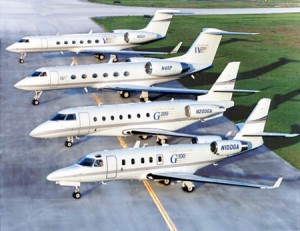Yesterday Judge Robert E. Gerber of the United States Bankruptcy in New York granted GM’s request to invalidate its leases on seven corporate jets and its huge hanger at the airport in Wayne County, Michigan.
Since the motion was unopposed — would anyone out there seriously consider arguing for corporate jets in the current political environment? — the hearing was short.
The Honorable Gerber ruled that GM could reject the leases under section 365 of the U.S. Bankruptcy Code, effective on the date of GM’s surrender of the planes and their hanger. AVN Air, LLC (AVN), General Electric Capital Corporation (GE Capital), SunTrust Equipment Finance & Leasing Corp. (SunTrust), Wayne County Airport Authority (WCAA) and US Bank were the business entities holding the leases.
The jets in question – two Gulfstream G5 models and five G4 models – are among the most expensive private aircraft in the world, ranging in price from $40 million to $50 million each when new, depending on optional equipment and custom interiors. Determining the fair market value of the jets in the currently depressed market for aircraft is difficult since few are selling.
Aircraft such as Gulfstreams are typically leased since special tax breaks bring the leasing cost down to about half the purchase price. Several of GM’s Gulfstreams had leasing prices at $26 million per. And GE Capital required deposits of $2.7 million — each — on five of the jets it financed.
The Gulfstream G4 and G5 jets are high flying, long range aircraft that easily outperform commercial jets. In fact, they have performance numbers once seen only in military aircraft. Gulfstream has produced some 1,800 aircraft for customers around the world since 1958. The company employs more than 9,700 people at seven major locations.
Overall the general aviation sectorthat Gulfstreams are part of used to be a $150 billion annual business with more than 1 million jobs directly attached to it. It has been hit hard by the recession, with companies slashing their workforces in half. Indirect employment around aviation in the U.S. might be as high as 11 million jobs and acccount for maybe 5% of the gross domestic product. It remains to be seen how deep the ongoing cuts will go, and when the industry will recover.
As of March 31, 2009, General Motors had consolidated global recorded assets of $82.3 billion and liabilities of approximately and $172.8 billion or more than twice assets, which was precisely the reason GM was in bankruptcy court. Global revenues recorded for fiscal year 2008 were approximately $150 billion, but will drastically decline this year as the full effects of the Global Great Recession continues to wreak havoc on all companies.

